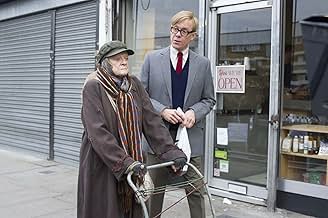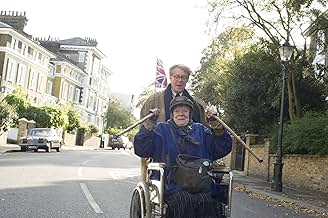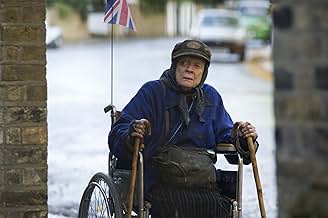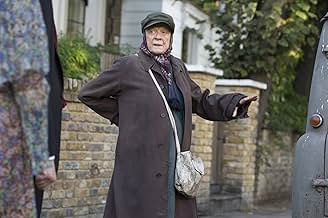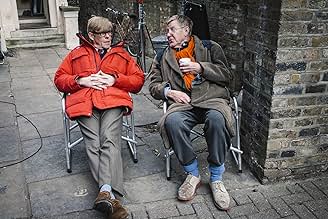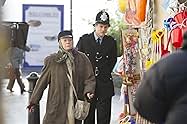AVALIAÇÃO DA IMDb
6,7/10
33 mil
SUA AVALIAÇÃO
Um homem forma um vínculo inesperado com uma mulher que mora em uma van.Um homem forma um vínculo inesperado com uma mulher que mora em uma van.Um homem forma um vínculo inesperado com uma mulher que mora em uma van.
- Indicado para 1 prêmio BAFTA
- 1 vitória e 8 indicações no total
Avaliações em destaque
"Lady in the Van" from 2015 is the "mostly" true story of playwright Alan Bennett's relationship with a woman who lived in various vans parked in his driveway for fifteen years. Bennett here is played by Alex Jennings, and the lady, Miss Shepherd, Maggie Smith.
Miss Shepherd, who smells awful from not bathing, lives in a crowded van and moves it from place to place, staying until she's thrown out or until she hears music. When she's told to move or do something else, she yells, as only Maggie Smith can do, "I'm a sick woman! Dying possibly!" Alan finds it impossible to break from her, though he tries. She prays very fervently and one time tells him that she spoke to the Virgin Mary at the post office. When he asks if the van is insured, she says she doesn't need it, she's insured in heaven. "So what happens if you have an accident?" Alan asks. "Who pays? The Pope?"
Alan is gay, though his friends are always trying to fix him up with a woman. One day Miss Shepherd says, "All those people who come and go in the dark, I know who they are." "Oh, Jesus," he says under his breath. "They're Communists!" she hisses. "Otherwise they wouldn't come and go in the dark."
Miss Shepherd is a woman of mystery - Alan finally learns that she studied piano, speaks fluent French, and was a nun. She also at times is seen going to someone's house in the dead of night. A man opens the door and comes outside. And someone stops by her van from time to time, and she gives him money.
In the end, we learn who these people are, her story of the convent, the history of her piano-playing, why she prays all the time, and who the men are.
Alex Jennings is perfect as Bennett (who appears at the end of the movie). He has his voice down pat, and in the film, there are two Alans - the writer Alan and the observer Alan, who talk with one another throughout the film. It's Alan who lives in the real world who encourages the writer Alan to be helpful to Miss Shepherd.
I am so privileged to have seen Maggie Smith in "Lettice and Lovage," one of my greatest evenings in the theater, where I laughed until I cried. At the end of that play, she gets on the phone and does a serious, touching monologue. She does the same here. Instead of the crazy homeless lady with the plastic bags we see and laugh at and wonder about during the play, she does a monologue that tells us who she is, and about her pain, heartbreak, and disappointments. "Why did you choose to be homeless?" Alan asks. "I didn't choose," she insists. "It was chosen for me."
A wonderful film about an uptight, cold man and a disturbed religious bag lady - you won't soon forget it.
Miss Shepherd, who smells awful from not bathing, lives in a crowded van and moves it from place to place, staying until she's thrown out or until she hears music. When she's told to move or do something else, she yells, as only Maggie Smith can do, "I'm a sick woman! Dying possibly!" Alan finds it impossible to break from her, though he tries. She prays very fervently and one time tells him that she spoke to the Virgin Mary at the post office. When he asks if the van is insured, she says she doesn't need it, she's insured in heaven. "So what happens if you have an accident?" Alan asks. "Who pays? The Pope?"
Alan is gay, though his friends are always trying to fix him up with a woman. One day Miss Shepherd says, "All those people who come and go in the dark, I know who they are." "Oh, Jesus," he says under his breath. "They're Communists!" she hisses. "Otherwise they wouldn't come and go in the dark."
Miss Shepherd is a woman of mystery - Alan finally learns that she studied piano, speaks fluent French, and was a nun. She also at times is seen going to someone's house in the dead of night. A man opens the door and comes outside. And someone stops by her van from time to time, and she gives him money.
In the end, we learn who these people are, her story of the convent, the history of her piano-playing, why she prays all the time, and who the men are.
Alex Jennings is perfect as Bennett (who appears at the end of the movie). He has his voice down pat, and in the film, there are two Alans - the writer Alan and the observer Alan, who talk with one another throughout the film. It's Alan who lives in the real world who encourages the writer Alan to be helpful to Miss Shepherd.
I am so privileged to have seen Maggie Smith in "Lettice and Lovage," one of my greatest evenings in the theater, where I laughed until I cried. At the end of that play, she gets on the phone and does a serious, touching monologue. She does the same here. Instead of the crazy homeless lady with the plastic bags we see and laugh at and wonder about during the play, she does a monologue that tells us who she is, and about her pain, heartbreak, and disappointments. "Why did you choose to be homeless?" Alan asks. "I didn't choose," she insists. "It was chosen for me."
A wonderful film about an uptight, cold man and a disturbed religious bag lady - you won't soon forget it.
Like all the best English comedies, the humor in "The Lady in the Van" is founded on character and in eccentricity but then we should expect nothing less from the pen of the great Alan Bennett. This is mostly a true story we are told and it's the story of a very eccentric lady and one, or is it two, quite eccentric men. The lady is Mary, or is it Margaret, Shepherd who might be considered homeless were it not for the van she lives in. The somewhat eccentric man is Bennett himself. I said two because in this case we get two Bennetts for the price of one, Alan the writer and Alan the householder and they are both played by Alex Jennings.
Miss Shepherd really existed and she's the lady who, at Bennett's request. moved her van from the street outside his house, where she had parked it, into his driveway. Initially she was due to stay a few months but ended up parking there for 15 years. Bennett turned the story of her stay first into a novella and then into a play and now, under the direction of Nicholas Hytner, into a film and a beautiful job he's made of it.
Of course, for the purpose of dramatic and comic effect Mr Bennett has taken liberties, adding bits here and there including a delightful phantasmagorical ending. He also surrounds himself and Miss Shepherd with a host of other characters, some almost as eccentric as they are. Recreating the part she played on stage Maggie Smith is magnificent in the title role. Of course, you could say Maggie has been playing variations of Jean Brodie for the past 45 years. It's easy to see Miss Brodie in the put-downs of the Dowager, Countess of Grantham had Jean been born into a different generation or class and it's not much of a step to see Miss Shepherd as an older, very much down-on-her-luck Jean Brodie. A third Oscar is certainly not out of the question.
Jennings, too, has Bennett off to a tee and there's lovely support from the likes of Frances De La Tour, Roger Allam and Deborah Findlay as sundry neighbors while the entire cast of Bennett's "The History Boys" manage to pop up in one form or another. If it feels slighter than some of Bennett's other offerings it may simply be because here he is writing about someone we would probably pass in the street without looking twice at. Of course, if on meeting Miss Shepherd in the street we knew what we know now, we might indeed give her a second or even a third glance; we might even invite her to move her van into our driveway. Slight? Not a bit of it.
Miss Shepherd really existed and she's the lady who, at Bennett's request. moved her van from the street outside his house, where she had parked it, into his driveway. Initially she was due to stay a few months but ended up parking there for 15 years. Bennett turned the story of her stay first into a novella and then into a play and now, under the direction of Nicholas Hytner, into a film and a beautiful job he's made of it.
Of course, for the purpose of dramatic and comic effect Mr Bennett has taken liberties, adding bits here and there including a delightful phantasmagorical ending. He also surrounds himself and Miss Shepherd with a host of other characters, some almost as eccentric as they are. Recreating the part she played on stage Maggie Smith is magnificent in the title role. Of course, you could say Maggie has been playing variations of Jean Brodie for the past 45 years. It's easy to see Miss Brodie in the put-downs of the Dowager, Countess of Grantham had Jean been born into a different generation or class and it's not much of a step to see Miss Shepherd as an older, very much down-on-her-luck Jean Brodie. A third Oscar is certainly not out of the question.
Jennings, too, has Bennett off to a tee and there's lovely support from the likes of Frances De La Tour, Roger Allam and Deborah Findlay as sundry neighbors while the entire cast of Bennett's "The History Boys" manage to pop up in one form or another. If it feels slighter than some of Bennett's other offerings it may simply be because here he is writing about someone we would probably pass in the street without looking twice at. Of course, if on meeting Miss Shepherd in the street we knew what we know now, we might indeed give her a second or even a third glance; we might even invite her to move her van into our driveway. Slight? Not a bit of it.
"The Lady in the Van"
I added this movie to my watch-list months ago, as soon as I saw the premise and Maggie's name in it's description. Just watched it. And it's EXACTLY what I expected it to be. :)
The plot: (without spoilers)
It's a poignant portrayal of a homeless woman who finds shelter when a lonely writer out of his timidness (don't confuse it with politeness, although being England, timid is good, too) lets her park her van in his driveway. Their bond, which was supposed to end within a few months, lasts almost 15 years.
The review: (without spoilers)
From the starting, you'll be hooked to the character of Maggie Smith, thanks to her glorious acting and the delightful character, Mary/Margaret/Miss Sheperd, she brings life to. Alex Jennings, who plays Alan, the man who lets her stay in her driveway, is quite a delightful actor himself. I don't think I've seen him in any other flicks. Yet.
Regardless to say, the acting is superb. The plot is adorable and heartbreaking, both at the same time. It's a perfect little drama movie with loads of charming humor, mainly delivered by Maggie. Yes, it gets a bit, as the other reviewers have put it, "dull" in the second half, but I think it's perfectly fine, because going in halfway, I expected nothing else. By the time it ended, there was a sense of contentedness in my heart. Also, it had stopped raining, not that THAT matters! :P
In short, this movie is a perfect, "bundle of joy".
I give it: 7.5/10
Also, I have noticed most of the British flicks go unnoticed, here on IMDb. I really wonder why. I have been tracking this one here for months and still it has only 10K or so votes and a lower rating than it deserves. Anyway, I hope this review will attract more viewers? I don't know, but one CAN hope.
That's it for now folks! :)
I added this movie to my watch-list months ago, as soon as I saw the premise and Maggie's name in it's description. Just watched it. And it's EXACTLY what I expected it to be. :)
The plot: (without spoilers)
It's a poignant portrayal of a homeless woman who finds shelter when a lonely writer out of his timidness (don't confuse it with politeness, although being England, timid is good, too) lets her park her van in his driveway. Their bond, which was supposed to end within a few months, lasts almost 15 years.
The review: (without spoilers)
From the starting, you'll be hooked to the character of Maggie Smith, thanks to her glorious acting and the delightful character, Mary/Margaret/Miss Sheperd, she brings life to. Alex Jennings, who plays Alan, the man who lets her stay in her driveway, is quite a delightful actor himself. I don't think I've seen him in any other flicks. Yet.
Regardless to say, the acting is superb. The plot is adorable and heartbreaking, both at the same time. It's a perfect little drama movie with loads of charming humor, mainly delivered by Maggie. Yes, it gets a bit, as the other reviewers have put it, "dull" in the second half, but I think it's perfectly fine, because going in halfway, I expected nothing else. By the time it ended, there was a sense of contentedness in my heart. Also, it had stopped raining, not that THAT matters! :P
In short, this movie is a perfect, "bundle of joy".
I give it: 7.5/10
Also, I have noticed most of the British flicks go unnoticed, here on IMDb. I really wonder why. I have been tracking this one here for months and still it has only 10K or so votes and a lower rating than it deserves. Anyway, I hope this review will attract more viewers? I don't know, but one CAN hope.
That's it for now folks! :)
When you see vagrants sleeping rough in doorways it is grimly fascinating to wonder how they got there. Was it a gradual descent due to drink or drugs? Or was it an 'explosive decompression' – an event so dramatic it capsized an otherwise stable existence? In a gripping pre-title sequence, it is the latter that sets up the back-story for Miss Shepherd – the titular "Lady in the Van" played by the marvelous Dame Maggie Smith.
Based on a "mostly true" story, Miss Shepherd lives in an old Bedford van progressing from unwelcome parking space to unwelcome parking space in the well-to-do Gloucester Crescent in Camden (a street that strangely the Google Streetview car has never ventured down!).
This introduces us to a selection of the local residents, including – bizarrely – the wife of composer Ralph Vaughan-Williams (Frances de la Tour). The wily Miss Shepherd can however spot a soft touch from miles away and latches onto the newest resident, famous playwright Alan Bennett played (in multiple concurrent forms) by Alex Jennings (doing a fine impersonation). When yellow-lines necessitate action, Miss Shepherd wheedles her van onto his driveway for "three months": three months that turns into 15 years.
I was in two minds from the trailer as to whether I wanted to see this film or not, and I'm so pleased that I did. What stands out, and what makes it so enjoyable, is the whip-smart and intelligent script by Bennett, based on his memoirs. The use of two Bennetts – one 'doing the writing' and one 'doing the living' – could be considered contrived, but allows the frustrations and inner demons (concerning his ailing mother 'up north') to be given a witty and articulate voice.
Despite getting progressively typecast as a vaguely batty old woman, Dame Maggie excels as the troubled Miss Shepherd – it is difficult to imagine many other actresses being able to pull off this larger than life role any better. When pathos is required (e.g. "Why did you choose to live like this?"; "I didn't choose I was chosen") she delivers it in heart breaking fashion. But her more comic pronouncements, such as the one about the number of "young men" visiting Bennett's house at "every hour of the day and night" obviously being "communists", were hilarious. What appears on the surface to be a mildly humorous movie turned out to have some serious belly-laughs.
Less successful in the film is the normally excellent Jim Broadbent, playing a retired copper with an unhealthy interest in the old lady. While this may have been a true part of the story, it really didn't come across very satisfactorily, and the scenes seem brash and out of kilter with the mood of the rest of the film.
A selection of cameos in the film include Dominic Cooper ("Captain America", "Mamma Mia") and (proving how long this film has been in the can) the now US celebrity presenter James Corden.
The slightly surreal ending of the film, set in a graveyard, might not be to everyone's taste, but I personally enjoyed it and it added to the kookiness of what turned out to be a pretty kooky film.
The film is directed by Nicholas Hytner. Although having a few notable movies to his credit ("The Madness of King George", "The History Boys"), he is better known as a regular director for National Theatre productions in London, and the film does have something of a 'stagy' feel about it. But as an example of a quintessential British film, based on a 'true' subject that seems barely credible, it makes for a heart-warming and highly entertaining trip to the movies. And in this week of the dreadful events in Paris, we could all do with that. Recommended.
(Please visit bob-the-movie-man.com for the graphical version of this review. Thanks).
Based on a "mostly true" story, Miss Shepherd lives in an old Bedford van progressing from unwelcome parking space to unwelcome parking space in the well-to-do Gloucester Crescent in Camden (a street that strangely the Google Streetview car has never ventured down!).
This introduces us to a selection of the local residents, including – bizarrely – the wife of composer Ralph Vaughan-Williams (Frances de la Tour). The wily Miss Shepherd can however spot a soft touch from miles away and latches onto the newest resident, famous playwright Alan Bennett played (in multiple concurrent forms) by Alex Jennings (doing a fine impersonation). When yellow-lines necessitate action, Miss Shepherd wheedles her van onto his driveway for "three months": three months that turns into 15 years.
I was in two minds from the trailer as to whether I wanted to see this film or not, and I'm so pleased that I did. What stands out, and what makes it so enjoyable, is the whip-smart and intelligent script by Bennett, based on his memoirs. The use of two Bennetts – one 'doing the writing' and one 'doing the living' – could be considered contrived, but allows the frustrations and inner demons (concerning his ailing mother 'up north') to be given a witty and articulate voice.
Despite getting progressively typecast as a vaguely batty old woman, Dame Maggie excels as the troubled Miss Shepherd – it is difficult to imagine many other actresses being able to pull off this larger than life role any better. When pathos is required (e.g. "Why did you choose to live like this?"; "I didn't choose I was chosen") she delivers it in heart breaking fashion. But her more comic pronouncements, such as the one about the number of "young men" visiting Bennett's house at "every hour of the day and night" obviously being "communists", were hilarious. What appears on the surface to be a mildly humorous movie turned out to have some serious belly-laughs.
Less successful in the film is the normally excellent Jim Broadbent, playing a retired copper with an unhealthy interest in the old lady. While this may have been a true part of the story, it really didn't come across very satisfactorily, and the scenes seem brash and out of kilter with the mood of the rest of the film.
A selection of cameos in the film include Dominic Cooper ("Captain America", "Mamma Mia") and (proving how long this film has been in the can) the now US celebrity presenter James Corden.
The slightly surreal ending of the film, set in a graveyard, might not be to everyone's taste, but I personally enjoyed it and it added to the kookiness of what turned out to be a pretty kooky film.
The film is directed by Nicholas Hytner. Although having a few notable movies to his credit ("The Madness of King George", "The History Boys"), he is better known as a regular director for National Theatre productions in London, and the film does have something of a 'stagy' feel about it. But as an example of a quintessential British film, based on a 'true' subject that seems barely credible, it makes for a heart-warming and highly entertaining trip to the movies. And in this week of the dreadful events in Paris, we could all do with that. Recommended.
(Please visit bob-the-movie-man.com for the graphical version of this review. Thanks).
Enjoyed it much more than I thought I would. Despite thinking very highly of Maggie Smith, Alex Jennings and Jim Broadbent et al, considering Alan Bennett a talented writer and liking previous work by Nicholas Hytner and George Fenton, the title was not particularly appealing to me, likewise with the subject matter based on a true story unfamiliar to me.
What a pleasant surprise though. Although not a great film and having its faults, 'The Lady in the Van' is a good film with a lot to like and perfect for a rainy day or wanting to let your hair down and relax in the evening. A strong example of not judging a film by its title. Whether 'The Lady in the Van' will garner a wide audience is hard to tell, it is very quintessentially British with a subject matter that perhaps a lot of people won't know much about to properly connect with and the script is written in a style that will work for some and not for others.
'The Lady in the Van' does have its flaws. The length of the film is longer than necessary for a story that is somewhat thin, meaning that there is some draggy pacing in the second half and some resolutions take too long to get there and feel too conveniently wrapped up.
On top of that, the ending, despite having a genuinely moving build-up, seemed to be an attempt at pathos and being uplifting but ended up feeling clumsy, confusing and almost like a cheat (almost like the rest of the film didn't happen). Jim Broadbent's scenes didn't work for me either, they just felt out of place in the film and jar tonally and while Broadbent is a great actor he isn't particularly memorable here.
However, 'The Lady in the Van' is beautifully filmed and handsomely produced, while George Fenton's music score is gentle and sometimes quirky and fits ideally with the film's mood. It also incorporates and arranges pre-existing classical music with ease, the use of Chopin's first piano concerto being the most striking and giving a real sense of pathos. There was the worry as to whether the humour would not feel right and do justice to a story that is quite tragic in a way.
No worries there. The script, with Bennett's style written all over it, is subversive, thought-provoking in how its messaging and what it's trying (and succeeds) to say is conveyed and full of very sharp scathing witticisms, do admit to laughing out loud a number of times. Hytner's direction is understated but always with a sense that he knows what he's doing and where to go.
Maggie Smith is truly magnificent here and worthy of some kind of award nod. Her character easily could have been an annoying caricature, especially in lesser hands, but Smith is often funny and deliciously batty but also gives the character a vulnerability. Alex Jennings is similarly marvellous and also deserving of award recognition, nailing Bennett's nuances, rhythm and how he speaks to a tee. The whole alter ego stuff is obvious early on and it is not always easy who is the real Bennett and who is the alter ego (only occasionally though), but that is in no way an issue, actually it was part of the fun. The chemistry between them is a joy and they work very well with the rest of the cast, who also do very well with some familiar and welcome faces.
On the whole, a very pleasant surprise and much better than expected. 7/10 Bethany Cox
What a pleasant surprise though. Although not a great film and having its faults, 'The Lady in the Van' is a good film with a lot to like and perfect for a rainy day or wanting to let your hair down and relax in the evening. A strong example of not judging a film by its title. Whether 'The Lady in the Van' will garner a wide audience is hard to tell, it is very quintessentially British with a subject matter that perhaps a lot of people won't know much about to properly connect with and the script is written in a style that will work for some and not for others.
'The Lady in the Van' does have its flaws. The length of the film is longer than necessary for a story that is somewhat thin, meaning that there is some draggy pacing in the second half and some resolutions take too long to get there and feel too conveniently wrapped up.
On top of that, the ending, despite having a genuinely moving build-up, seemed to be an attempt at pathos and being uplifting but ended up feeling clumsy, confusing and almost like a cheat (almost like the rest of the film didn't happen). Jim Broadbent's scenes didn't work for me either, they just felt out of place in the film and jar tonally and while Broadbent is a great actor he isn't particularly memorable here.
However, 'The Lady in the Van' is beautifully filmed and handsomely produced, while George Fenton's music score is gentle and sometimes quirky and fits ideally with the film's mood. It also incorporates and arranges pre-existing classical music with ease, the use of Chopin's first piano concerto being the most striking and giving a real sense of pathos. There was the worry as to whether the humour would not feel right and do justice to a story that is quite tragic in a way.
No worries there. The script, with Bennett's style written all over it, is subversive, thought-provoking in how its messaging and what it's trying (and succeeds) to say is conveyed and full of very sharp scathing witticisms, do admit to laughing out loud a number of times. Hytner's direction is understated but always with a sense that he knows what he's doing and where to go.
Maggie Smith is truly magnificent here and worthy of some kind of award nod. Her character easily could have been an annoying caricature, especially in lesser hands, but Smith is often funny and deliciously batty but also gives the character a vulnerability. Alex Jennings is similarly marvellous and also deserving of award recognition, nailing Bennett's nuances, rhythm and how he speaks to a tee. The whole alter ego stuff is obvious early on and it is not always easy who is the real Bennett and who is the alter ego (only occasionally though), but that is in no way an issue, actually it was part of the fun. The chemistry between them is a joy and they work very well with the rest of the cast, who also do very well with some familiar and welcome faces.
On the whole, a very pleasant surprise and much better than expected. 7/10 Bethany Cox
Você sabia?
- CuriosidadesThis movie was shot in the actual house on the street where the events took place, Gloucester Crescent in Camden Town. Some of the same people still lived there when the star prop arrived, decades later.
- Erros de gravaçãoMargaret/Mary is shown parking her new Commer van in the drive of Alan Bennett's house and she pulls up on the handbrake in the middle of the van, where a handbrake would normally be. In fact Commer vans had their handbrake to the right of the driver's seat between the seat and the door - not between the two front seats.
- Citações
Rufus: Sorry, you can't park here.
Miss Shepherd: No, I've had guidance. This is where it should go.
Rufus: Guidance? Who from?
Miss Shepherd: The Virgin Mary. I spoke to her yesterday. She was outside the post office.
Rufus: What does she know about parking?
- Cenas durante ou pós-créditosDuring the first part of the credits, a young Margaret can be seen playing the piano at her concert in King's Hall.
- ConexõesFeatured in Alan Bennett at 80: Bennett Meets Hytner (2014)
- Trilhas sonorasPiano Concerto No. 1 In E Minor, OP. 11
Written by Frédéric Chopin
Performed by Clare Hammond and BBC Concert Orchestra
Orchestra Leader Charles Mutter
[The principal piano piece that recurs throughout the film is Chopin's Piano Concerto 1, using both the slow middle (second) movement "romanza" and the quick final (third) movement "rondo". Alfred Cortot was especially associated with playing Chopin's piano oeuvre.]
Principais escolhas
Faça login para avaliar e ver a lista de recomendações personalizadas
- How long is The Lady in the Van?Fornecido pela Alexa
Detalhes
- Data de lançamento
- Países de origem
- Central de atendimento oficial
- Idiomas
- Também conhecido como
- The Lady in the Van
- Locações de filme
- 23 Gloucester Crescent, London, Greater London, Inglaterra, Reino Unido(Alan Bennett's house where the events actually occurred)
- Empresas de produção
- Consulte mais créditos da empresa na IMDbPro
Bilheteria
- Orçamento
- US$ 6.000.000 (estimativa)
- Faturamento bruto nos EUA e Canadá
- US$ 10.021.175
- Faturamento bruto mundial
- US$ 41.387.687
- Tempo de duração1 hora 44 minutos
- Cor
- Mixagem de som
- Proporção
- 1.85 : 1
Contribua para esta página
Sugerir uma alteração ou adicionar conteúdo ausente

Principal brecha
By what name was A Senhora da Van (2015) officially released in India in Hindi?
Responda






